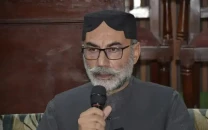Domestic, global issues detract foreign investors
Investment drops 6% to $1.7b in July-May 2010-11, FDI drops 30%.

Foreign investment in the country dropped six per cent to $1.74 billion in the first 11 months of the current financial year, because of unsatisfactory security conditions, unattractive economic policies and lack of political will to forge trade alliances with regional economic powerhouses.
According to data released by the State Bank of Pakistan (SBP) on Tuesday, out of total foreign investment, foreign direct investment fell 30 per cent to $1.39 billion in July-May 2010-11 compared to $1.98 billion in the same period last year. Foreign portfolio investment, however, rose a massive 360 per cent to $347 million compared to an outflow of $134 million last year.
Standard Capital Securities Head of Research Faisal Shaji attributed the decline in foreign investment to unfriendly economic policies and a precarious security environment, which not only reduced the rate of return for prospective investors but also caused fears about their life and property.
Another area that the analyst said the government must increasingly focused on was regional integration with emerging economic giants – China, Malaysia and Turkey – which had the potential to inject billions of dollars into Pakistan’s economy and strike big trade deals. However, he said, “there is no political will and focus on this area by the government.”
Besides domestic issues, international developments have had an impact on the reduced inflow of foreign investment into Pakistan, Shaji said. The uncontrollable European debt problem, with Greece on the brink of default, has threatened the entire global financial system as repercussions of a default in Europe will be felt as far away as in the United States.
The US too is struggling to lift its faltering economy with a $600 billion bond purchase programme dubbed ‘quantitative easing’, which increases money supply in the system and swells banking reserves. This global economic slowdown since the 2008 financial crisis has also reduced the flow of investment into Pakistan.
According to SBP data, US investment in Pakistan fell 45 per cent to $470 million in July-May 2010-11 while EU investment dropped 70 per cent to $200 million. UK investment also declined with investors pouring $209 million, down 25 per cent from last year. However, investment from UAE rose 31 per cent to $274 million.
Oil and gas sector needs investment
Shaji said the oil and gas exploration and production sector needed investment the most. “The government should make its petroleum policy market-oriented, which will encourage foreign investors to invest in this country and even in sensitive areas,” he said.
In July-May, the oil and gas exploration sector saw foreign investment decrease 34 per cent to $433 million. In power projects, foreign investment surged 467 per cent to $132 million while telecommunications attracted $80 million investment, down 79 per cent.
Discussing portfolio investment, Shaji said that despite an increase in investment, it was less than the potential because of unattractive stock prices. The capital gains tax on stock investment, which requires filing of tax returns, has also discouraged investment in bourses as investors are wary of direct contact with tax authorities. “Re-routing of domestic investment through foreign channels into the stock exchange, which had previously been done by market players, has also stopped,” he pointed out.
Published in The Express Tribune, June 15th, 2011.



















COMMENTS
Comments are moderated and generally will be posted if they are on-topic and not abusive.
For more information, please see our Comments FAQ